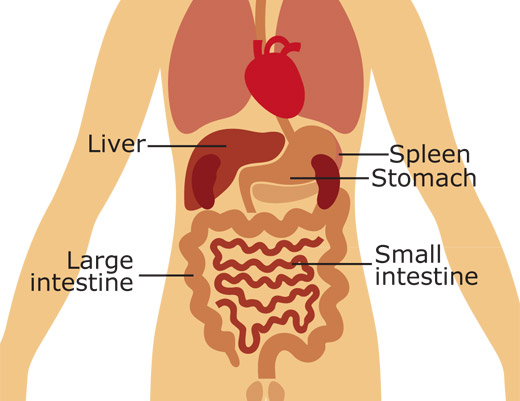Bleeding in the abdomen
There are many organs in the body that can be injured and bleed. The classical organs are in the upper abdomen and mostly protected by the lower ribs. These are the liver on the right and the spleen on the left.

Anatomy of the abdomen
The liver
The liver is the “factory” of the body in that it processes many chemicals within the body and helps process what we eat into many different hormones, enzymes and energy stores. It is a large organ that sits behind the lower right ribs and underneath the diaphragm. As we breathe hard during sport, the diaphragm descends to help suck air into the lungs above it and the liver can peek out under the lower border of the right ribs. A liver injury is rare but can occur and it can tear or split in a contact sport setting.
The spleen
The spleen is a much smaller organ that sits under the left lower ribs. It acts a bit like an oil filter on a car in that it filters out old or unwanted blood cells from the circulation and also as a store for infection-fighting white blood cells should they be needed in a hurry. It can become significantly enlarged in some infections – most notably glandular fever – when it protrudes well below the ribs and even crosses the abdomen where it is very fragile and can easily rupture.
Glandular fever is a viral illness of young adults, such as those who typically play contact sports such as Rugby. But anyone who has had glandular fever should not play Rugby until a doctor has confirmed the spleen has returned to normal, such is the risk of injury and bleeding to an enlarged spleen.
The kidneys
The kidneys are paired organs that sit on either side of the body, one behind and slightly below both the liver and the spleen. They deal with removing the waste products from the blood and making urine for us to pass.
Signs of a possible abdominal injury
- May appear “winded” that fails to improve.
- May localise the pain to the right side of the abdomen (liver) or the left (spleen).
- Blood is irritant to the lining of the stomach and pain may spread to be felt elsewhere.
- May show signs of shock as time progresses and appear pale or show possible confusion.
- May pass bright red blood when passing urine (suggests a kidney injury).